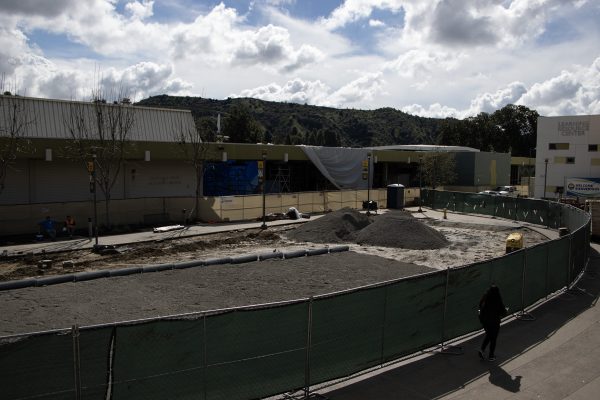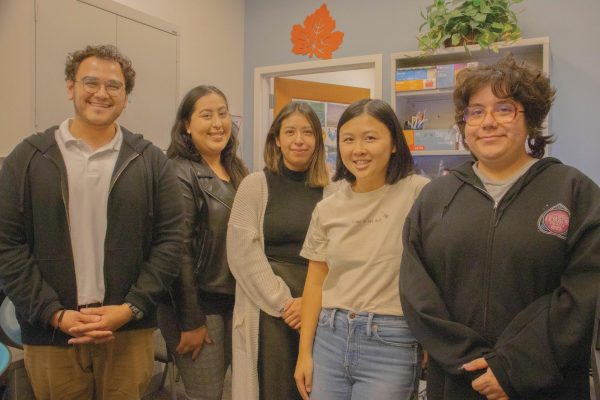Student election registration open
Applications for the Associative Students of Rio Hondo College, are available to all eligible students as of April 4. Those interested in running for office can go to their Rio Hondo email and open the “ASRHC Elections- Applications Open!” copy the Orgsync URL and head to the website to fill out the application form.
The application is full of terms and agreements to check off and requires a headshot of the candidate along with a statement. The purpose of this is to give voters a brief background on what the candidate stands for. This information will be available as a resource to students when they cast their vote online.
The deadline for applications is 3 p.m. on April 15.
In order to gauge student involvement in both elections and the ASRHC, El Paisano interviewed several student representatives.
Javier Eduardo Cano, ASRHC treasurer and chairman for the election committee, talked about the process of student voting.
“They log into their Accessrio portal and then from there, they open their email and click on the email that shows photos and candidate statements. From there on, you have a link to go vote or there’s also a link on your Rio portal that just says ‘vote.’”
Cano said that this voting method has been at Rio Hondo for more than four years.
This system both accommodates student availability, by allowing them to vote online rather than at a booth, and saves them the trouble of meeting their representatives, face to face.
Despite this method of voting which caters to students, records from last year’s election reveal a harrowing reality. According to Cynthia Morales, an administrator in the Student Union building, there was an average of 208 voters last year. Adding up to only one percent of the 18,432 students that were enrolled last spring. Morales attributed this low turnout to the election committee not advertising enough and failing to give students an incentive to vote.
She cited previous years when they had booths outside the Student Union building. They would walk students through the voting process on computers set up outside and reward those who voted with free pizza and an “I voted” sticker.
Without the alluring aroma of free food to incentivize students to participate in their school’s political system, Rio Hondo gets turnouts similar to those of last year.
This lack of student involvement isn’t limited to the yearly election. Throughout the year, students have not shown much interest in what their elected representatives do on behalf of them. This is an issue that the student government has been trying to address this year by creating the public relations senator position.
William Ashby, ASRHC president, recalled the low turnout in the town hall meeting they held at the student lounge for the new hydration station. The meeting was open to the student community and intended to inform the students on what process they went through to make sure the stations were acquired.
An open mic was included for the students to ask them questions.
Ashby stated that they did not get as many students at the forum as they had hoped for. He conceded it was due in part to the ASRHC not holding any town hall meetings last year, however he is optimistic that the next one will be well-attended.
Another example was cited by Efrain Ruiz, the legislative committee chairman, who recognized the lack of student input in the task force committees, where they discuss policies that directly affect students. Ruiz noted the problem and attempted to organize task force meetings in a way that would be convenient for students to attend.
Yet he has had difficulty doing so with all the committees and student turnout is still low for the ones that have adjusted. “I really tried to work this semester to make all task forces organized and set times, but the only task forces that have managed to do that are Sustainability, Student Success and Legislative Affairs.” Ruiz said.
It is important for the student community to be involved in student government affairs, such as the Hydration Station Forum, because these representatives handle over $200,000 of the student populace’s money.
The fund comes from the representative fee that students pay when registering for classes.
Ashby estimates the yearly funds to be around $300,000 but after various fees and expenses, such as an accounting fee of $20,000, a good portion is exhausted. “At the end of the day, we are managing about $200,000 yearly.”
The funds are managed by Cano, who monitors the funds of every committee and advises them how to spend it on events, based on the spending patterns of committees in previous years. When ASRHC members go on retreats and conferences, he sets a budget as a means of accountability and proper management.
This can arguably be considered his most important role as treasurer.
On maintaining accountability when allocating funds to committees Ashby stated, “We try to be extremely transparent with all the dollars.”
Transparency is important, not just for holding representatives accountable for their spending actions, but also to see the value of their efforts.
Ashby talked about how the student government shows their value to the student populace through the standards they hold themselves to while attending conferences. “The students want to make sure that when we are going on retreats, we are bringing something back to the campus that’s actually going to benefit the students.”
An example of this is their trip to D.C. to lobby government representatives for the extension of the Pell Grant and an expansion to the Higher Education Act. They lobbied certain aspects of the Higher Education Act. For instance, students getting two years of free community college and receive additional funds for specific programs.
Voting isn’t just important during presidential elections, local elections have the most imminent impact in the community members lives. Voting for the student body of Rio Hondo college is as local as it gets.
Be sure to vote online between April 25 and April 28.






